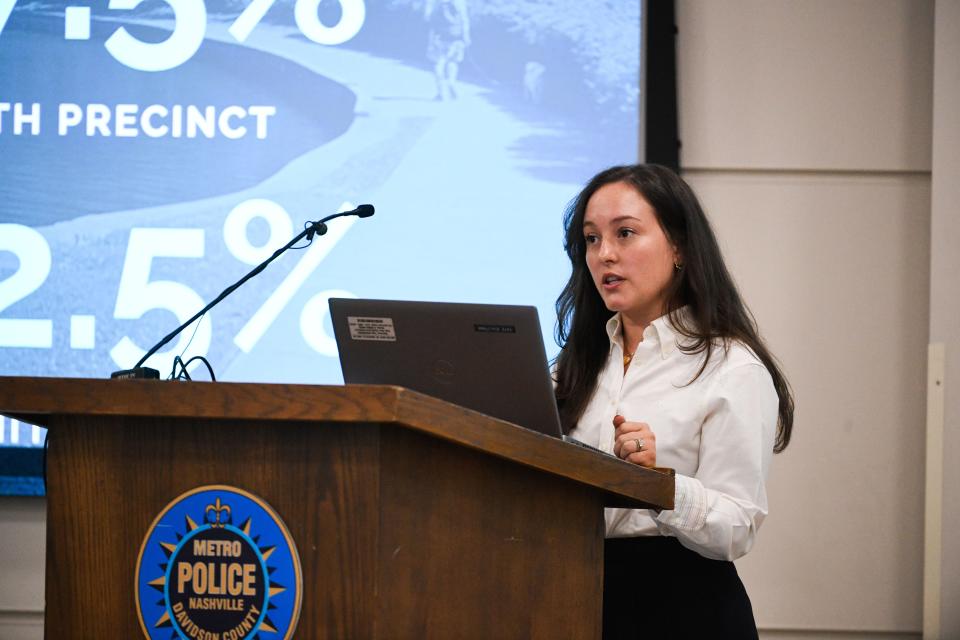Mental health crisis program requires community support for success | Opinion
Who should you call for someone experiencing a mental health crisis? The police or someone that you trust who is trained in de-escalation and mental health?
We've have seen how the presence of law enforcement, nationally and locally, can unintentionally escalate a situation. In 2021, there were nine fatal police shootings in Nashville, three of which were mental health related.
Nationwide, at least 25% of people who are shot and killed by police officers suffer from acute mental illness at the time of their death. Nashville Organized for Action and Hope (NOAH) has worked on mental health diversion− access to mental health and avoidance of jail− since its inception in 2015, announcing the Health Engagement & Liaison Services (HEALS) model in March 2021.
Hear more Tennessee Voices: Get the weekly opinion newsletter for insightful and thought provoking columns.
Why other cities prefer a non-law enforcement model
Across the country, people are realizing that mental health crises need to be treated as community health issues, rather than as law enforcement problems. Some of the cities that have non-law-enforcement first responders are Denver, Colorado, Oakland, California, Portland, Oregon, Albuquerque, New Mexico, Olympia, Washington and Philadelphia, Pennsylvania.

The nationally-known CAHOOTS program in Eugene, Oregon has built incredible community trust over its 30-year history. NOAH’s program is based on the CAHOOTS model and is called HEALS.
In June 2022, Nashville Metro Council approved funding to Metro Health and Fire Departments for a non-law enforcement response program. After NOAH’s two years of advocacy, council members believed they were voting for a HEALS model.
Metro received technical assistance for planning the program from the Federal Substance Abuse and Mental Health Services Administration (SAMHSA). But who is actually at the planning table?
NOAH representatives were Rev. Jane Boram and Rev. Joe Ingle. Planning sessions began in April 2022 and concluded on Aug. 18. Of the 18 committee members who supposedly represented community health or advocacy groups, only seven attended meetings regularly. Metro employees dominated the planning process.
Sign up for Black Tennessee Voices newsletter: Read compelling columns by Black writers from across Tennessee.
Sign up for Latino Tennessee Voices newsletter:Read compelling stories for and with the Latino community in Tennessee.
Community members need to trust programs if they're to be successful
Reverend Boram, Lindsey Krinks (Open Table Nashville) and Han Service-Rodriguez (Park Center) all asked for more diversity and a broader involvement of Nashville’s BIPOC (Black, indigenous, and people of color), LGBTQ and unhoused residents in this planning. Their request was denied.
New Haven, Connecticut also participated in this same SAMHSA planning. Once they realized that they didn't have real community involvement, they suspended their planning until 14 neighborhood “listening sessions” could be held.
They saw that the community must trust any mental health response program, or people simply will not call for help if they fear harm to family members in crisis.
NOAH suggested a similar approach in an effort to really involve the community. We asked to meet with the Metro co-chairs of the planning group to discuss this. This request was also denied.

Your state. Your stories. Support more reporting like this.
A subscription gives you unlimited access to stories across Tennessee that make a difference in your life and the lives of those around you. Click here to become a subscriber.
Quite simply, we just want this program to work. The present leadership of the committee has chosen to ignore SAMHSA guidelines that call for broad community engagement.
Nashville residents must trust this new project if it is to be successful. Metro Council and the Mayor’s Office need to halt this planning process and include real diversity and community participation to build the trust needed for people to use this or any other program.
Rev. Jane Boram is the co-chair of Nashville Organized for Action and Hope (NOAH)− a faith led coalition that is multi-racial and interdenominational comprised of congregations, community organizations, and labor unions that work to give voice to traditionally marginalized people.
This article originally appeared on Nashville Tennessean: Mental health crisis program requires community support for success

